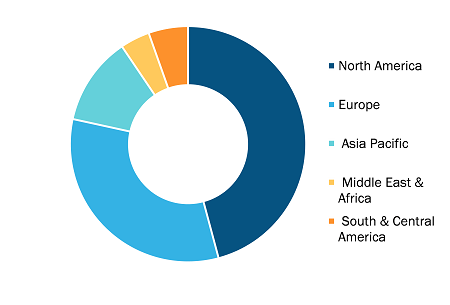Infectious Diseases Segment to Lead In-Vitro Diagnostic Market During 2022–2030
According to our new research study on “In-Vitro Diagnostic Market Forecast to 2030 – Global Analysis – by Product and Service, Application, Technology, and End User,” the in-vitro diagnostic market size was valued at US$ 72,393.80 million in 2022 and is expected to reach US$ 1,12,103.51 million by 2030; the market is estimated to register a CAGR of 5.6% from 2022 to 2030. Key factors driving the growth of the in-vitro diagnostic market include the increasing prevalence of chronic and infectious diseases, and the surge in demand for in-vitro diagnostics during the COVID-19 pandemic.
Increasing Prevalence of Chronic and Infectious Diseases
The world is witnessing an exponential increase in the prevalence of infectious diseases. These diseases are prominently caused due to pathogenic microorganisms, such as viruses, bacteria, and parasites. Factors such as poor sanitary conditions, lack of public hygiene, elevating levels of air pollution, and unavailability of safe drinking water play a significant role in the bolstering prevalence of infectious diseases. According to the Public Health Agency of Canada, the country reported a total of 6,736 cases of hepatitis C (acute, chronic, and unspecified combined) in 2020.
In-Vitro Diagnostic Market, by Region, 2022(%)
In-Vitro Diagnostic Market Size and Forecasts (2020 - 2030), Global and Regional Share, Trends, and Growth Opportunity Analysis Report Coverage: By Product & Service (Reagents & Kits, Instruments, and Software & Services), Technology (Immunoassay/ Immunochemistry, Clinical Chemistry, Molecular Diagnostics, Microbiology, Blood Glucose Self-Monitoring, Coagulation and Hemostasis, Hematology, Urinalysis, and Others), Application (Infectious Diseases, Diabetes, Oncology, Cardiology, Autoimmune Diseases, Nephrology, and Others), End User (Hospitals, Laboratories, Home Care, and Others), and Geography (North America, Europe, Asia Pacific, the Middle East & Africa, and South & Central America)
In-Vitro Diagnostic Market Dynamics and Analysis by 2030
Download Free Sample
Source: The Insight Partners Analysis
Chronic diseases prominently include cancer, chronic respiratory diseases, diabetes, and heart disease. The incidences of these conditions are skyrocketing globally due to biological risk factors, such as an increase in alcohol and tobacco consumption, adoption of unhealthy diets, lack of physical activity, and prevalence of obesity. Chronic conditions are the leading cause of mortality globally. According to the Centers for Disease Control and Prevention (CDC), 6 in 10 Americans live with at least 1 chronic disease, such as stroke, cancer, heart disease, or diabetes. These chronic diseases are the leading causes of death and disabilities, and burgeoning healthcare costs in the US; the country’s healthcare cost was ~US$ 4.1 trillion in 2021. The CDC data also suggests that heart disease is the leading cause of death among men, women, and people of most racial and ethnic groups.
Based on application, the in-vitro diagnostics market is segmented into infectious disease, diabetes, oncology, cardiology, autoimmune disease, nephrology, and others. In 2022, the infectious disease segment held the largest share of the market. The same segment is expected to register the highest CAGR of 4.6% in the market during the forecast period, which can be ascribed to the rising prevalence of infectious diseases such as SARS-CoV-2, HIV, AIDS, TB, and pneumonia. Infectious diseases can be largely prevented from spreading to other parts of the body or other people when diagnosed early. Early diagnosis through real-time testing is beneficial in providing information for treatment. The prevalence of HIV in Canada has surged in recent years. According to the Government of Canada, 1,472 new cases of HIV were reported in 2021, recording an increase of 11.3% over the cases diagnosed in 2020. According to the CDC, 30,635 people received an HIV diagnosis in the US in 2020. Therefore, the growing prevalence of infectious diseases such as HIV and hepatitis is bolstering the demand for in-vitro diagnostics, thereby propelling the market growth substantially during 2022–2030.
Abbott Laboratories, F. Hoffmann-La Roche Ltd, Danaher Corp, Siemens AG, Sysmex Corp, Thermo Fisher Scientific Inc, Becton Dickinson and Co, bioMerieux SA, Bio-Rad Laboratories Inc, and Qiagen NV are among the leading companies operating in the in-vitro diagnostic market.
The global in-vitro diagnostics market is segmented into product & service, technology, and application. Based on product & service, the market is categorized into reagents & kits, instruments, and software & services. In terms of technology, the in-vitro diagnostics market is segmented into immunoassay/immunochemistry, clinical chemistry, molecular diagnostics, microbiology, blood glucose self-monitoring, coagulation and hemostasis, hematology, urinalysis, and others. The in-vitro diagnostics market, by application, is fragmented into infectious diseases, diabetes, oncology, cardiology, autoimmune diseases, nephrology, and others. The in-vitro diagnostic market, by end user, is segmented into hospitals, laboratories, home care, and others. The in-vitro diagnostics market, based on geography, is segmented into North America (the US, Canada, and Mexico), Europe (Germany, France, Italy, the UK, Spain, and Rest of Europe), Asia Pacific (Australia, China, Japan, India, South Korea, and Rest of Asia Pacific), the Middle East & Africa (South Africa, Saudi Arabia, the UAE, and Rest of the Middle East & Africa), and South & Central America (Brazil, Argentina, and Rest of South & Central America).
Contact Us
Phone: +1-646-491-9876
Email Id: sales@theinsightpartners.com